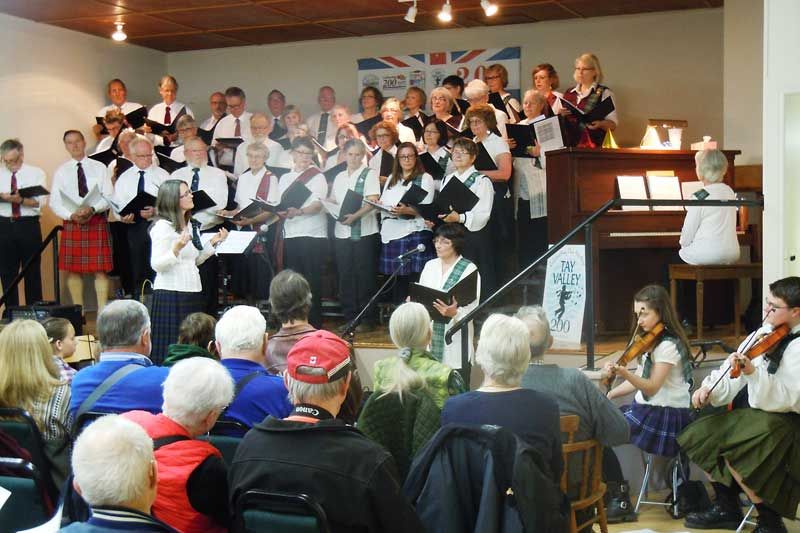Apr 20, 2016
On April 16, music lovers were treated to a concert celebrating 200 years of history in Tay Valley. The concert, titled “Tay Valley 200th: A Song Celebration”, was performed by the Tay Valley Community Choir at the Maberly Hall. It blended a chronological historical narrative read by individual members of the choir, and each section was accented by a musical number suited to the particular period.
In her opening remarks to the capacity crowd, choir director, Rebecca Worden, thanked those who contributed to the narratives, including Maureen Bostock, the Irish Times, Diary of Rev. William Bell, Bud Van Alstine, Emily Weaver, and Kay Rogers. Rogers spoke about the book she put together to mark the historic 200th anniversary event.
The narrative began with the area's pre-colonial history, describing the over 5,000 years that Algonquin people inhabited the land. At the time of European contact in 1603, the Algonquins numbered approximately 6000. Today, they number 11,000 and are spread across multiple First Nations in Quebec and Ontario. The choir's first song, “Colours of the Wind”, honoured the Algonquin people, past and present, and showcased the choir's impeccable four-part harmonies under the confident direction of Worden.
Mary Lou Carroll proved she is a more than capable piano accompanist, and her impressive intros helped set the bar in many of the songs the choir performed.
The narrative moved through various time periods and places, including across the Atlantic, to Scotland in the early 1800s. The choir honoured those first settlers with their sing-along tune, “My Bonnie Lies Over the Ocean.” The Scottish Insurrection that occurred in Scotland at the end of the Napoleonic War of 1815 due to a depressed economy was recognized with the tune “A Wee Deoch and Doris.”
Ireland also experienced hardships during the same time period. Irish Catholic emigration to Canada attracted farmers, many of whom settled in the area and brought songs like the still popular “Molly Malone”, another festive sing-along tune at the show.
Settlement in Lanark County began in 1815, and the tune “Flying Free” paid homage to the Scottish highlanders, who accepted the free passage and 100 acres of land offered to them. The perilous crossing was highlighted with the modern tune, “Skyfall”, aimed to demonstrate the difficulty of the passage across the ocean as experienced by many immigrants.
The concert continued with Natalie Reynolds on piano and Lukas Reynolds on fiddle, opening up the second half with their highly polished medleys. The sets included many popular Scottish, Irish and English favorites like High Road to Linton, The Fairies of Montecello, and St. Anne's Reel. The duo showed how traditional music from the area's first European settlers continues to inspire musicians of all ages in the township today.
The choir's songs and narrative continued with tunes like “Here Comes the Sun” and “Land of the Silver Birch”, the latter relating to the help the first settlers received from the Algonquins as they tried to survive their first winter.
“The Log Driver's Waltz” and “Bridge Over Troubled Water” were also woven into the historical narrative, and the effect of words and song together made a great impact on the listeners.
Audience members not only left with a better understanding of the history of Tay Valley, but also with a greater appreciation for the choir, who did a marvelous job relating the wide range of emotions that the 200-year history of Tay Valley can evoke.
More Stories
- Latest CUPW Job Action Stops Postal Delivery Of The Frontenac News Forcing Alternate Plans
- Opponents of Barbers Lake Gravel Pit Pack Ag Hall in McDonalds Corners
- Bobsleigh Olympian Jay Dearborn At Mikes Pizza In Sydenham
- The Roar (Lions Club Of and O'Lakes)
- North Frontenac Back Roads Studio Tour - September 27 and 28
- Sunday Market Vendors Give Back
- George Street Work As Town Hall Renovation Nears Completion
- One Way Street Plan Hits A Dead End - Central Frontenac Council, September 9
- Global Gardening
- No Winner Yet in Catch The Ace But Fundraising Target Met

